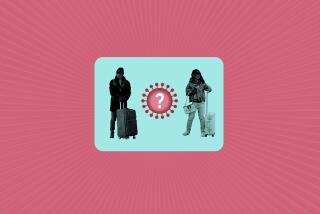Advice on How to Find Medical Help on a Trip
- Share via
It was one of the worst days I had ever spent abroad. It was a Sunday, I was in Athens and I was painfully ill. I knew my embassy was closed and instead of seeking an emergency telephone number I decided to pursue a doctor’s advertisement in the Athens News.
I spent about three minutes in his office. He wrote out a prescription and told me the charge was $80 U.S. I had the feeling that it was a special price for tourists, but I wasn’t in any shape to argue.
Fortunately, I had bought supplementary medical coverage before I left home. I still had to pay the cash on the spot, but I was able to get full reimbursement several months after I got home. My regular medical coverage would only have covered the cost charged for similar services at home, which was about $18.75.
I learned a few difficult lessons during that trip. One was to make sure that your medical coverage is valid for all fees you could be charged. Another was to take advantage of services that help you find English-speaking doctors with economical set fees, and also to pay attention to health warnings made by local guides.
Result of Dehydration
I learned that my illness was the result of dehydration because I simply didn’t drink enough water when I was in the Sinai Desert the previous week.
Staying healthy and safe can make the difference between a successful and a disappointing trip. Here are some steps you can take to minimize your risks:
Contact your doctor well in advance of your trip about any medical precautions you should take. You’ll also find that some major city hospitals have traveler’s clinics that can help you. If you need shots, don’t wait until so close to your time of departure that there is a possibility of leaving with a sore arm if you have a reaction.
Certain medications must be begun before you leave home, and some drugs, such as anti-malaria medication, must be taken for several weeks after you leave a risk area.
You can get a list of English-speaking doctors around the world who charge economical set fees and can supply detailed information on tropical diseases and medical precautions. That is available if you join the International Assn. for Medical Assistance to Travelers. Membership is by donation. Contact IAMAT at 736 Center St., Lewiston, N.Y. 14098.
-- -- --
If you, your parents or even your grandparents were born in a foreign country that you intend to visit, it’s a good idea to double-check your citizenship status and obligations with that country’s consulate before you leave home. You may be eligible for military duty and could be inducted if you enter that country.
Be sure to ask about visa regulations before your trip. It’s possible to buy an airline ticket and then be denied permission to board because you haven’t obtained the required documentation to enter the country where the plane is scheduled to land. A travel agent can help you find out what is required.
When you have your tickets, passport and travelers checks organized, make a photocopy of all the information and numbers. Leave a copy with a friend or family member at home. If you lose everything you’ll only be a telephone call away from the information you’ll need to arrange replacements. When you’re on the road, keep these guidelines in mind:
Border Crossings
Be careful about crossing borders with new friends. Some countries assume guilt by association. If you are with someone who is caught carrying an illegal substance you may be in just as much trouble as the guilty party.
Also, some countries, such as France and those in Latin America, practice a system of law that is different from ours. It’s called Code Napoleon. Put simply, it means that you are guilty until proved innocent.
If you’re unsure about the political stability of a country you’re thinking of visiting, check with your embassy for any travel advice. If you don’t feel comfortable going there on your own, ask a youth or student travel bureau if any budget tours operate into the area.
When you’re with a group, don’t be pressured by your guide into buying souvenirs. Many guides earn part of their income by taking commissions from shopkeepers.
More to Read
Sign up for The Wild
We’ll help you find the best places to hike, bike and run, as well as the perfect silent spots for meditation and yoga.
You may occasionally receive promotional content from the Los Angeles Times.






